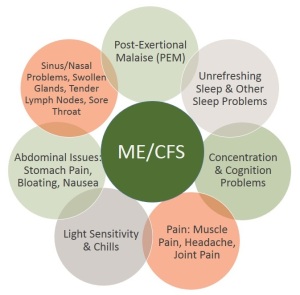
Taken from http://solvecfs.org/what-is-mecfs/
What Is It?
Chronic fatigue syndrome (CFS)–aka chronic fatigue and immune dysfunction syndrome (CFIDS) aka myalgic encephalomyelitis (ME)–is an illness characterized by intense, deep, and persistent fatigue and exhaustion. Definite immune system abnormalities have been found in the majority of CFS patients, hence the alternate names (“myalgic” = of or relating to myalgia, which is muscle pain; “encephalomyelitis = inflammation of the brain and spinal cord, usually due to viral infection).
About 1 million, less than 1%, of Americans have CFS, and among them, more women are affected than men. The cause is unknown–though current thoughts trend toward infection, immune disorder, or neurological disorder–and there is no cure. CFS produces some similar symptoms to fibromyalgia syndrome (FMS) and the two often occur together, but there are differences.
What Are the Symptoms?
A syndrome is a set of symptoms that occur together, indicating the existence of a particular disease. Therefore, chronic fatigue syndrome most commonly presents the following set of symptoms:
- as stated above, overwhelming, persistent fatigue
- post-exertional malaise–disproportionate exhaustion lasting at least a day after mental or physical exercise
- pain–muscle pain; joint pain without swelling or redness; headaches
- unrefreshing sleep; sleep difficulties
- impaired memory and concentration; brain fog, cognitive difficulties
- frequent or recurring sore throats
- tender and/or enlarged lymph nodes in the neck and armpits
- other flu-like symptoms
Additional symptoms (and disorders) that often occur along with these are:
- gastrointestinal problems
- allergies and sensitivities to foods, odors, chemicals, medications
- depression, mood swings, irritability
- visual disturbances (blurry sight, light sensitivity, eye pain)
- dizziness, balance problems, fainting; difficulty maintaining an upright posture
- chills, night sweats
- gynecological problems, including PMS
- chronic inflammation of the bladder wall (interstitial cystitis), chronic pelvic pain
- temporomandibular joint disorder (TMJ)
I think what really sets CFS apart from FMS are the flu-like symptoms that often precipitate and accompany the illness. If not for a lack of these flu-like symptoms, I would believe that I have chronic fatigue syndrome rather than fibro. But who knows. I could even have both, which is called comorbidity–the simultaneous presence of 2 (or more) chronic medical conditions in 1 person. Many fibro and CFS sufferers can attest to having comorbidity.
Are you a CFS sufferer? Do you experience comorbidity? How do you cope?
